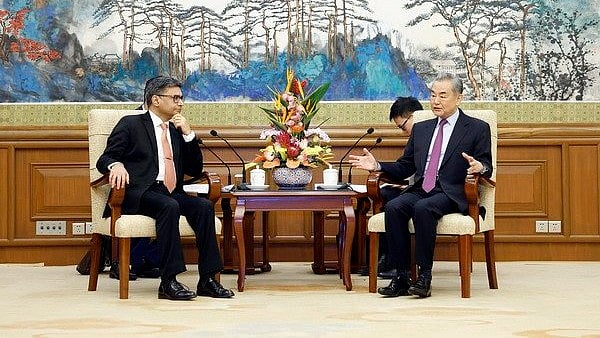
Foreign Secretary Vikram Misri held wide-ranging talks with Chinese Vice Foreign Minister Sun Weidong in Beijing.
Credit: X/@China_Amb_India
New Delhi: The top diplomats of New Delhi and Beijing on Monday agreed to restart from this year itself the annual pilgrimage organised by the Government of India to Kailash Mansarovar in the Tibet Autonomous Region of China.
The two sides agreed to have a meeting of the experts soon for discussion on reviving the mechanism created through bilateral pacts in 2002 and 2005 for China to share with India hydrological data on transboundary rivers Yarlung Tsangpo (Siang/Brahmaputra) and Langqên Tsangpo (Sutlej). New Delhi has been concerned over Beijing’s plan to build a mega dam on Yarlung Tsangpo in Tibet to generate hydroelectric power.
They also agreed in principle to restart direct flights between Indian and Chinese cities and decided that the relevant technical authorities on the two sides would meet and negotiate an updated framework for this purpose at an early date, according to a press release issued by the Ministry of External Affairs in New Delhi.
The Kailash Mansarovar Yatra organised by the Ministry of External Affairs of the Government of India could not be held since 2020 – firstly due to the Covid-19 pandemic and then due to the strains in bilateral relations with China caused by the military stand-off, which started along the Line of Actual Control in eastern Ladakh in April-May 2020 and continued till October 2024.
Foreign Secretary Vikram Misri and his counterpart, Chinese Vice Foreign Minister Sun Weidong, met in Beijing on Monday and resumed the dialogue between the top diplomats of the two governments – a mechanism, which was also discontinued due to the military stand-off over the past four-and-a-half years.
Misri also called on Chinese Foreign Minister Wang Yi, who said that the two sides should seize the opportunity, meet each other halfway, explore more substantive measures, and commit to mutual understanding, mutual support, and mutual achievement, rather than mutual suspicion, mutual alienation, and mutual consumption.
The two sides agreed to hold an early meeting of the India-China Expert Level Mechanism to discuss the resumption of the provision of hydrological data and other cooperation pertaining to trans-border rivers, according to the MEA press release.
Misri and Sun agreed that the modalities to resume the Kailash Mansarovar Yatra in the summer of 2025 would be discussed as per existing agreements.
Since the 1980s, the MEA had been organising an “official” Kailash Mansarovar Yatra every year, according to bilateral pacts between India and China.
Prime Minister Narendra Modi's first meeting with Chinese President Xi Jinping in New Delhi in September 2014 had seen China accepting the long-pending request from India to open another route for Kailash Manasarovar Yatra as an alternative to the one via Lipulekh Pass, which had not only required trekking for several days but had also turned worse during periods of inclement weather. The new and less difficult route for the pilgrimage through Nathu La had been opened in 2015.
The stand-off formally ended with the Indian Army and the Chinese People’s Liberation Army on October 21 agreeing upon a patrolling arrangement for Depsang and Demchok areas – the last two face-off points along the LAC to be resolved. Two days later, Modi and Xi had a bilateral meeting – first in five years – on the sideline of the BRICS summit at Kazan in Russia and agreed to restart not only boundary negotiations by the special representatives of the two governments but also regular dialogues at the level of foreign minister and top diplomats.\
Though the Modi-Xi meeting marked a thaw, a new irritant emerged last month with Beijing deciding to go ahead with its plan to build the hydroelectric project on Yarlung Tsangpo.
New Delhi stressed in diplomatic contacts with Beijing that the interests of downstream states should not be harmed by activities in upstream areas of Yarlung Tsangpo, known as Siang and Brahmaputra in Arunachal Pradesh and Assam of India.
India and China do not have an agreement for the sharing of water of transboundary rivers. Due to the strains in ties over the military stand-off along the LAC, the two MoUs on hydrological data sharing could not be renewed after they expired – one on Sutlej in 2020 and the other on Brahmaputra in 2023.
The two sides recognised that 2025, being the 75th anniversary of the establishment of diplomatic relations between India and China, should be utilized to redouble public diplomacy efforts to create better awareness about each other and restore mutual trust and confidence among the public. The two sides will conduct a number of commemorative activities to mark this anniversary.
Misri and Sun took stock of the extant mechanisms for functional exchanges. It was agreed to resume the dialogues step by step and to utilize them to address each other’s priority areas of interest and concern. Specific concerns in the economic and trade areas were discussed with a view to resolving these issues and promoting long-term policy transparency and predictability, the MEA stated.
